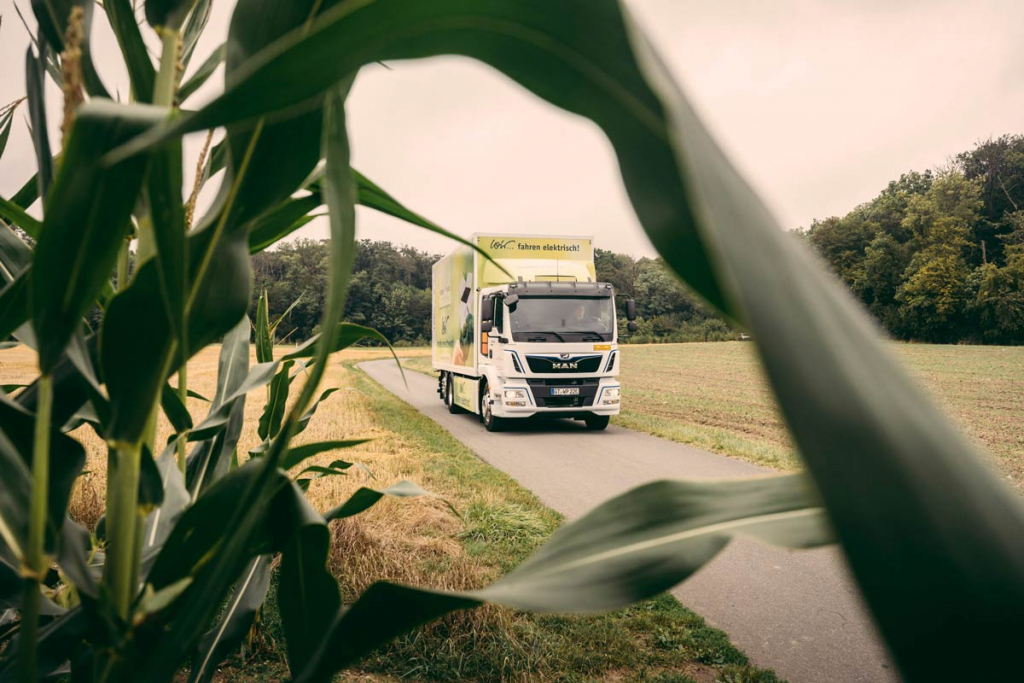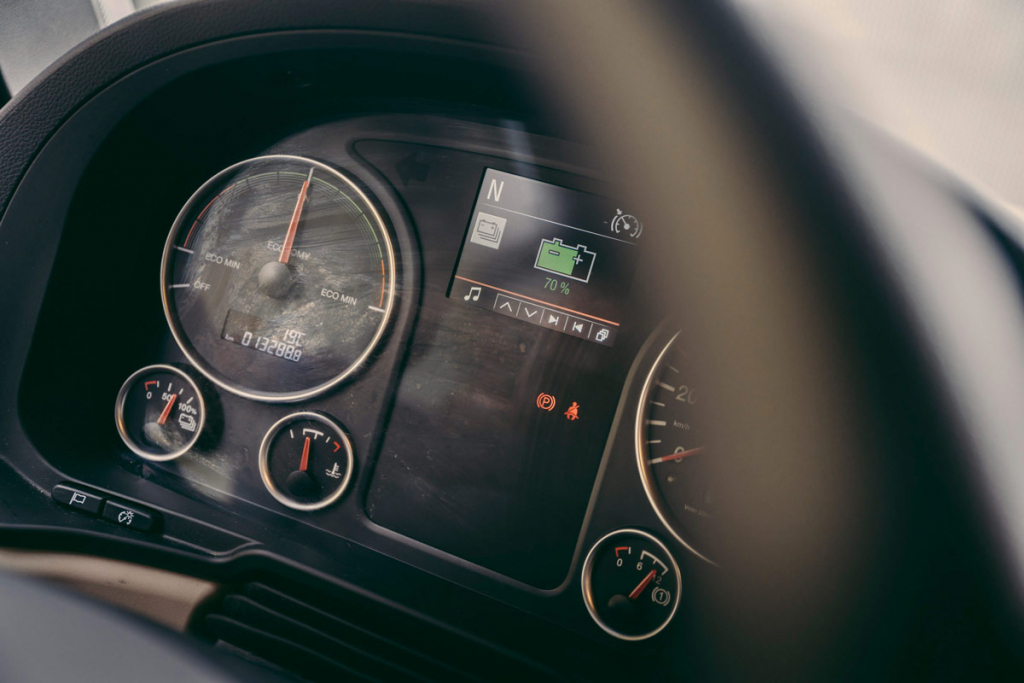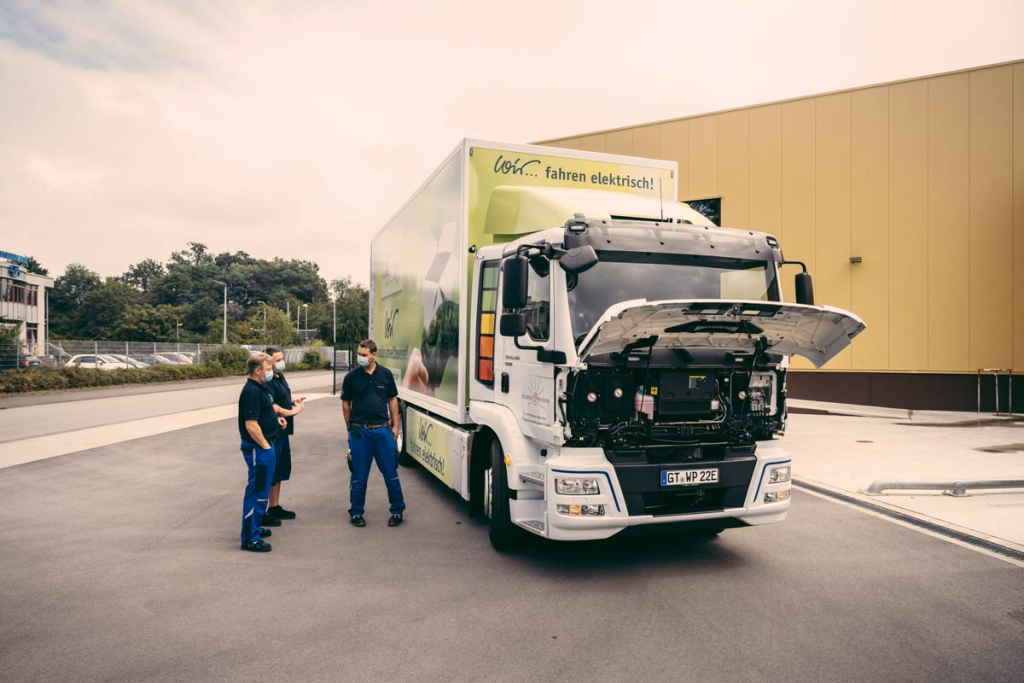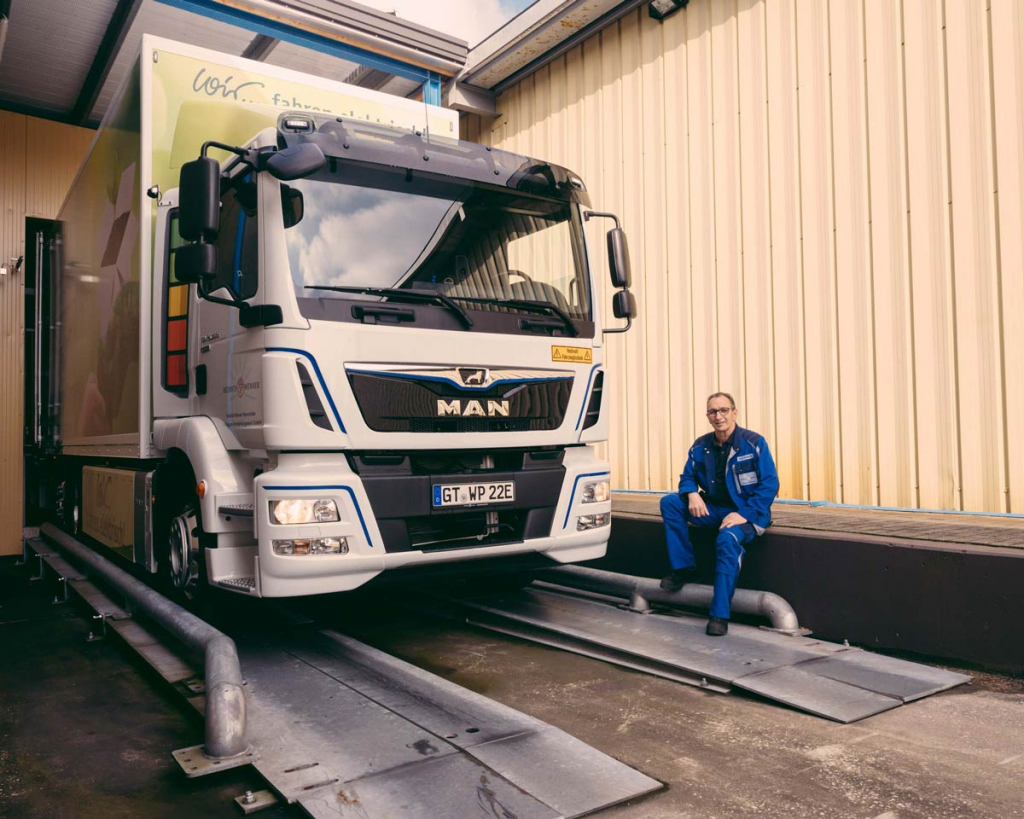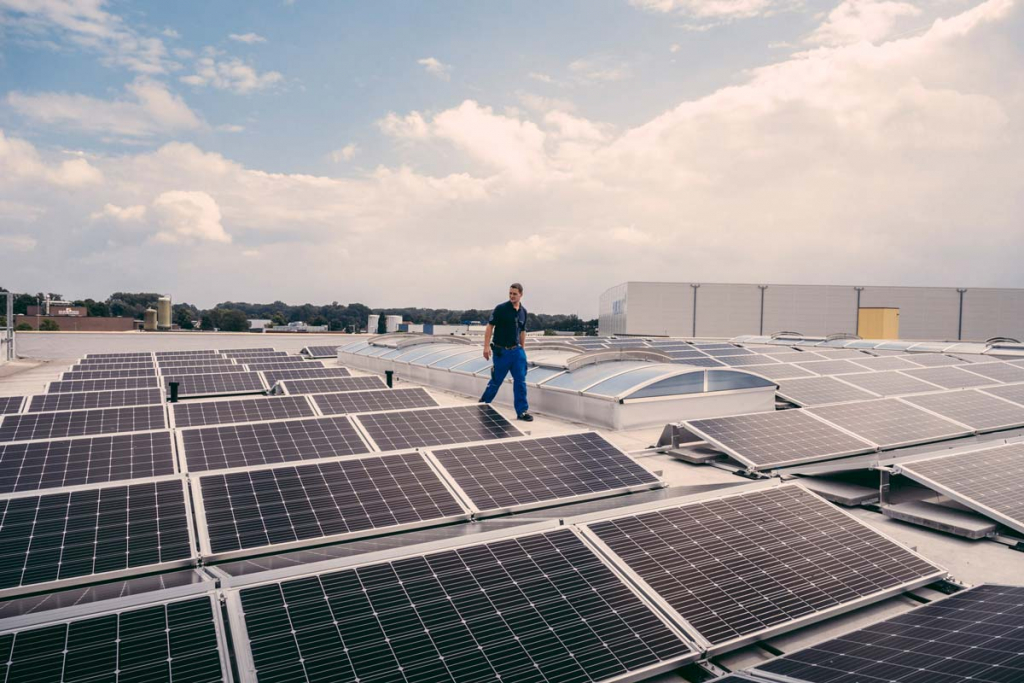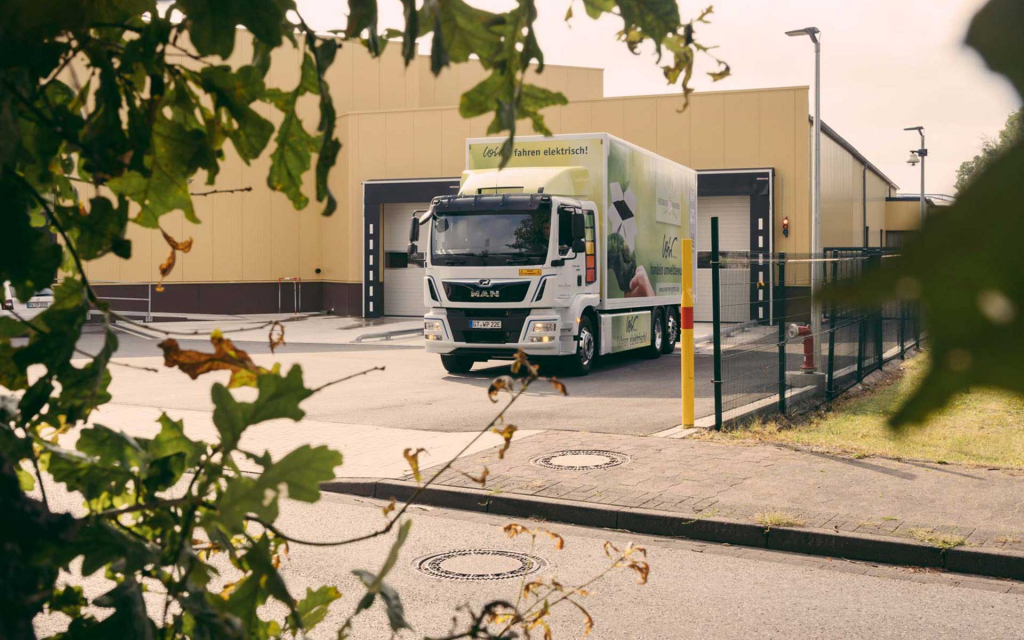
Mission Zero Emission
Out of conviction: Stephan Potthoff-Wenner set his family business on a sustainability heading more than 12 years ago. Recycling, solar power and heat pumps are part of everyday life at his company that manufactures cardboard boxes for packaging. As are two electric vehicles by MAN that he recently acquired for the business.
Stephan even sets an example on his commute to work and gives us a wave as he turns into the company yard on his e-bike. “I’ll just put my bike away and then I’ll be right with you.” He arrives at the office soon after in jeans and a patterned shirt. The 63-year-old is unconventional – not what you’d expect of a boss of a family business based in the rather down-to-earth Münsterland region of Germany. The same goes for his place of work. A World Wildlife Fund poster hangs on one of the walls, a shelf holds books with such titles as ‘Wunderwerk Erde’ (‘Miracle Earth’) and ‘Zu neuen Ufern’ (‘To new shores’). Business and ecology – the two are not mutually exclusive for Stephan. “We want our children to still be able to enjoy a natural world that’s beautiful. There’s nothing more valuable for us to leave them.”
That’s the guiding principle by which he manages his company (he’s the third generation of his family to run the business). Green energy is today just as natural to him as is waste recycling and using electric vehicles. It doesn’t have a negative effect on his business success. On the contrary, the company, which is based in Versmold, is enjoying steeply rising sales and profits.

Cardboard instead plastic
The company makes packaging from solid cardboard. Food manufacturers use the dense boxes for their meat, fish, vegetables or ready-meal products. The demand in Germany for solid board has increased to 500,000 tonnes in recent years, 30,000 tonnes of which are produced at the Wenner factory. More and more businesses are shunning plastic packaging and opting for recyclable material. “Our market is characterised by the fact that product flows run almost full circle,” Stephan says. Around 98 per cent of the packaging produced in Versmold is made from waste paper.
The boss explains as he takes us on a tour of the production facilities that even the cardboard scrap is recycled: Software-controlled knives cut shapes so intelligently out of the printed cardboard bases as they disappear into the punching machine that little waste remains. The unavoidable scraps are dropped on to a belt and collected. “A container holding 15 tonnes of punched waste and waste paper is returned to the supplier every two to three days,” says Stephan. The material is cleaned, prepared and processed into new cardboard there.
Electricity bill stock
It was a long time before the graduate in business administration gave any thought to sustainability. It wasn’t until 2009 when the company took a new state-of-the-art plant for printing cardboard boxes (designed to make the packaging look as beautiful and colourful as customers wanted) into operation.
That was followed by a massive shock: The company’s power consumption shot up by almost a third when the new system went live. “That’s when the penny dropped,” Stephan says. And it suddenly became clear to him: The company would need significantly more electricity every time it took a step forward. And he decided there and then that he wasn’t going to let that happen. So he started talking to people he trusted. “We came together to think about how we could limit the company’s carbon footprint.” Research and calculations followed. What benefits would energy-efficient systems deliver? Would it be worth building a wind turbine on the company’s premises? How would solar energy benefit the company? What would the costs be and what grants would be available? The answers to these questions made Stephan realise that the solution would have to involve solar power. The company’s rapid growth over many years means that it now needs two million kilowatt hours of electricity a year. Its own photovoltaic systems and the combined heat and power plant supply around 40 per cent of these requirements. “It’s our aim to generate between 50 and 70 per cent of what we need ourselves.” The in-house electricity storage system, which has been in operation since mid-2021, should also help achieve this goal. It allows the electricity generated by the photovoltaic systems to be stored for later use … by the company’s fleet of vehicles, for example.
The company only employed diesel trucks until recently. The vehicles are used to collect unprocessed cardboard from the supplier in Varel, Friesland, and deliver finished packaging to customers across Germany. Modern engines and training the drivers how to be environmentally aware while on the road enabled the company to reduce the fleet’s average consumption to 27 litres per 100 kilometres. “A comparatively good value for heavy trucks,” Stephan says.
Fuel theft?
But it was a completely different picture where the internal transport of the boxes to the next stages of production was concerned. It turned out shortly after the company started using diesel vehicles that they were consuming between 80 and 100 litres for every 100 kilometres. “Once we’d discovered that, our initial thought was that someone was stealing our fuel,” Stephan says. But the experts we consulted confirmed that diesel trucks did indeed guzzle so much on short trips.
That’s why the company joined forces with MAN to launch a project that would investigate how electric trucks could be used to handle internal transport requirements. The business acquired a MAN eTGM within the scope of the project. It was apparently the right decision: “The vehicle integrated well into our processes,” confirms warehouse manager Matthias Paul. It has a range of up to 190 kilometres and so only needs to be charged every few days – again with solar power that the company itself generates. “It takes just three to four hours to charge the battery to enable operations to continue,” Matthias says. Charging takes place at night when the company is closed.
It’s also possible to use MAN’s eTGM for trips to customers in the surrounding area. Which is confirmed by Harald Nawipotzki, who – before starting work at Wenner 10 years ago – drove trucks all over Europe delivering meat. What does a professional like him think about electric trucks? The 61-year-old is enthusiastic about them.
“The motor is so quiet so that driving is less stressful for me.”
He also likes the torque that is typical of electrically powered vehicles. “The motor engages immediately, which is a stark contrast to diesel trucks,” he says, adding that the 360 horsepower under the hood is perfectly adequate. It’s even too much for smaller deliveries. That’s when he switches to MAN’s eTGE. The van is the second electrically powered vehicle to join the company’s fleet.
Arriving soon: Hydrogen
The plan is to have all the company’s vehicles run on electricity in future. Stephan thinks that hydrogen-fuelled drives would be the best option because their lighter batteries make them more appropriate for long distances. The company has already joined a project to set up a hydrogen infrastructure in the region of East Westphalia-Lippe. A truck fitted with a fuel cell will soon be joining the fleet. “That will allow us to see which technology is best suited for which tasks.”
Trying out sustainable future technology for himself is one of Stephan’s passions anyway. That’s why he recently bought a fully electric sports car for himself. But he only intends to drive it to work when absolutely necessary because he enjoys cycling on his e-bike far too much otherwise.

